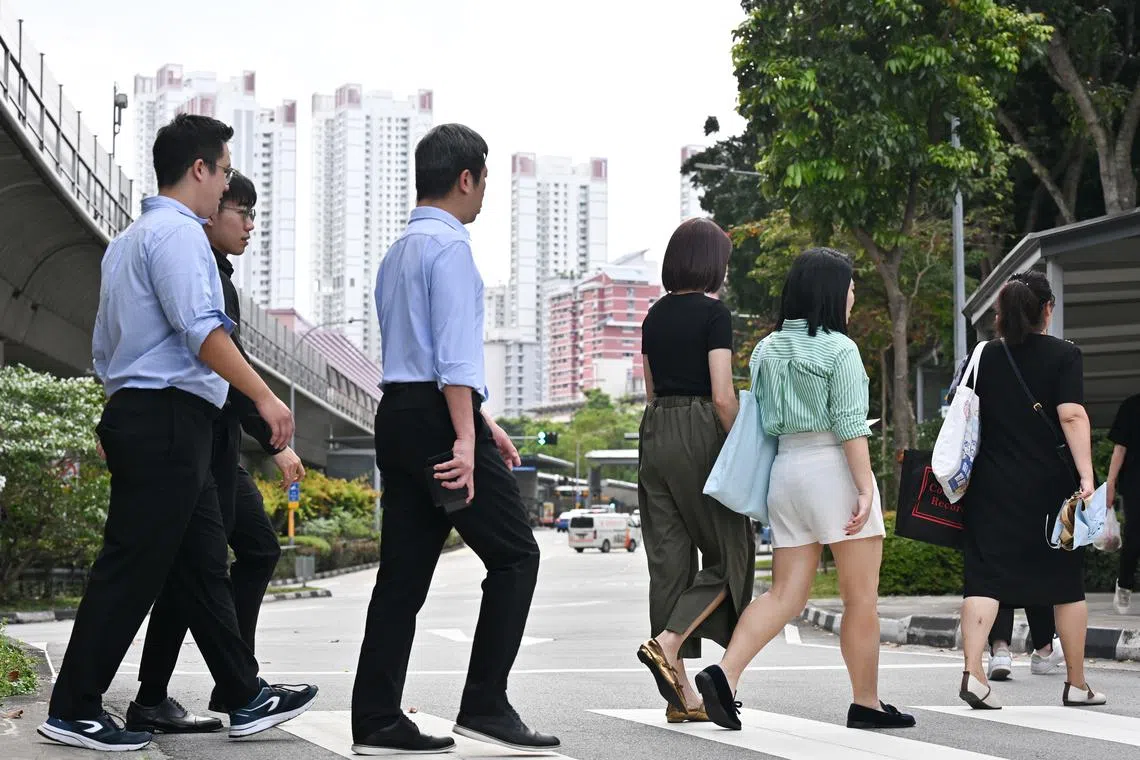Singapore professionals more optimistic about AI than US, UK workers: LinkedIn
Sign up now: Get ST's newsletters delivered to your inbox

The increased usage of AI has raised questions about its impact on manpower.
ST PHOTO: LIM YAOHUI
- Singapore professionals are highly optimistic about AI's impact on their work lives, ranking among the top globally.
- Younger professionals in Singapore are particularly hopeful about AI.
- Despite optimism, concerns remain about AI accuracy, and people still prioritise human relationships and professional networks for vital career decisions.
AI generated
SINGAPORE - Singapore professionals are among the most optimistic about the potential of artificial intelligence (AI) to improve their work lives, according to a LinkedIn survey released on Aug 26.
Around 69 per cent of professionals here shared the sentiment, putting them ahead of the UK at 59.4 per cent, Australia at 56.9 per cent and the US at 54.3 per cent.
However, the Republic trailed behind India (78.3 per cent) and the United Arab Emirates (77.2 per cent).
The networking platform had polled more than 19,000 full-time employees, part-time workers and active job seekers in 14 countries across three weeks in July.
The increased use of AI has raised questions about its impact on manpower.
Prime Minister Lawrence Wong during his National Day Rally speech on Aug 17 acknowledged concerns that the technology could replace some jobs, and said the Government will ensure workers benefit from the shift towards AI
He cited examples, such as that of port operator PSA, which retrained workers to remotely supervise and manage multiple cranes and vehicles. This resulted in a boost to productivity, and safer and higher-paying jobs.
Confidence in support from the Government is driving optimism, LinkedIn’s Asia-Pacific managing director Feon Ang told The Straits Times.
“Singapore has a strong record of helping workers upskill and adapt through disruption, with initiatives such as those announced at the National Day Rally, job-matching and traineeship schemes,
Workers are also taking the responsibility of AI upskilling into their own hands. LinkedIn has recently seen a 147 per cent growth in the share of time spent on AI and generative AI courses in Singapore.
On top of that, workers are actively adding AI-related skills to their profiles, Ms Ang observed.
“At the same time, they’re doubling down on picking up soft skills. That balance of technical fluency and human skills is exactly what’s needed to stay ahead in the age of AI,” she said.
“It’s like school – when you’ve prepared for an exam, you walk in with confidence. The same goes for work. When people feel ready for change, they feel optimistic about the future.”
Young professionals in Singapore, from the ages of 18 to 24, were found to be most hopeful about AI’s impact on their work lives. More than 80 per cent felt that the technology would be of benefit.
This echoed the findings of a recent study commissioned by US technology firm Zoom, which concluded that 65 per cent of Singapore respondents from the same age group were positive about AI usage at work.
Even so, they remained careful about AI and cited the accuracy of AI-generated outputs as their top concern, according to the study of 2,551 young people in the Asia-Pacific region.
Earlier in 2025, employment agency Randstad found that almost half of the young people it surveyed in Singapore expected AI to have a considerable impact on their jobs
Young people in the US and Britain appeared to be more pessimistic. Some 62 per cent of the respondents in these countries believed AI could replace their jobs within the next decade, according to a 2024 survey by technology education provider General Assembly.
LinkedIn’s Ms Ang noted that more than half of the young workers in Singapore were already using AI regularly, for tasks ranging from drafting e-mail to higher-level analysis.
“The more they use it, the more familiar and confident they are likely to become. That everyday experience helps them see AI’s benefits first-hand, which explains why younger professionals are the most optimistic about how it can support their work and lives,” she said.
She added: “Like any major paradigm shift, AI brings both disruption and opportunity. We’re in what I call the ‘messy middle’ – a time of experimentation, uneven adoption and constant reskilling.
“That naturally creates uncertainty, but history shows us that disruption always opens the door to new possibilities. For the vast majority of people, AI isn’t replacing their job but transforming it, and their next job might even be a role that doesn’t exist yet.”
AI hiring in Singapore is growing nearly 25 per cent faster than overall hiring, Ms Ang said. She encouraged professionals to experiment with AI tools and develop new capabilities, while doubling down on people-centric skills that cannot be replaced by technology.
General Assembly’s Singapore country manager Sima Saadat believes workers should go beyond generic AI training, and seek out tools that benefit their day-to-day work.
“In human resources, AI can help generate tailored interview questions, guide new hires through onboarding workflows, and help analyse employee sentiment to flag emerging issues,” she said.
“In the finance industry, AI can help with ethical, transparent and responsible financial analysis and decision-making, detecting anomalies and fraud.”
People still thrive on human relationships, even as AI becomes part of their daily lives, the LinkedIn survey found.
Only 30 per cent of respondents turned to AI tools like ChatGPT or Microsoft Copilot when making important career decisions, such as asking for a promotion or a raise, or deciding whether to accept a job offer.
Half of them would consult their professional network, while 43 per cent would speak to family or friends.
Those aged 18 to 24 demonstrated the strongest trust in professional networks among all the age groups – only 26 per cent of them said they trusted AI tools.


